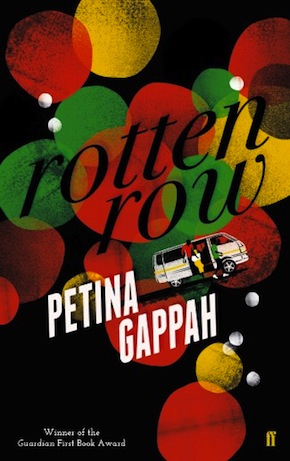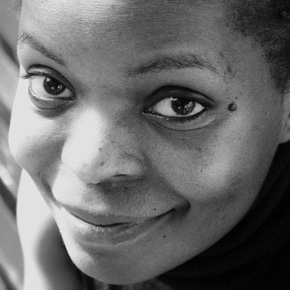Human rights and wrongs
by Petina Gappah
“If you want to know a country, read its writers.” Aminatta Forna, Guardian
The Old Familiar Faces are unhappily gathered at a once-elegant four-star golf resort and conference centre to which tourists no longer come. In the reception area and in their workshop room, the Jacaranda room on the second floor, banners proclaim the theme of their workshop: “Assessing, Analysing and Evaluating the Impact of Political Violence on the Coming Election: Problems and Perspectives from a Problematic Past.”
The banners are emblazoned with the Vision Statement of Umbrella, the organisation that has convened this workshop. “Our mission is to passionately partner human rights organisations in Zimbabwe in improving their competitive performance by professionally supporting and actively encouraging a professional and active human rights environment in Zimbabwe underpinned by a record of achievement, professionalism and excellency.”
The Vision Statement was developed painstakingly by Umbrella’s senior staff at a four-day Strategic Planning workshop in Victoria Falls, with the assistance of a highly paid motivational speaker slash pastor and a donor-provided management consultant. After the opening prayer and the introductions, after the pam-pam of appreciation for the moderator and the resource persons of the morning session, after all protocol had been observed and after the welcoming of the Special Guest, who is the new First Secretary at the European embassy that is the sponsor of this event, the Familiar Faces cluster to bemoan their fate over Choice Assorted biscuits, lukewarm tea and instant chicory coffee.
They know each other well, the Old Familiar Faces. Since the beginning of the Zimbabwe Crisis more than a decade ago, they have spent many hours together at seminars, workshops, conferences, colloquiums and other outreach programmes. But they still wear around their necks bright red lanyards that identify their names and organisational affiliations. That, by the way, is one of their favourite phrases. Not where do you work or who are you with but what is your organisational affiliation. They are very educated, the Old Familiar Faces. They pride themselves on their Excellent English.
Mrs Chikombe was Born Again, a mercifully releasing process that involves the erasure of sinful pasts without necessarily requiring a concomitant commitment to a sinless future.”
To one side, within comfortable reach of the biscuits, stands Mrs Maudie Chikombe, the convenor of the workshop and Mr Collins Dube, the moderator of the morning session.
Mrs Chikombe, a well-known Feminist Activist, is a flamboyant woman who favours loud prints and dirty-blonde wigs. She long ago lost a half-hearted battle against middle-age spread, but underneath her layers of lurid clothing, artificial hair and excess body weight are glimpses of the loveliness that used to transport Mr Dube into delight on the many nights they spent together at NGO gatherings around the country. Such had been her comeliness that it had induced Mr Dube to launch her career in the NGO sector just after her Master’s degree in Rural and Urban Planning.
Their affair burned out many years before Mrs Chikombe was married. It goes without saying that Mr Dube was already married, but that is by the way, and more importantly, it was before Mrs Chikombe was Born Again, a mercifully releasing process that involves the erasure of sinful pasts without necessarily requiring a concomitant commitment to a sinless future.
Though he has become broad before and broad behind, Mr Dube has aged significantly better than his former paramour, for what he has lost in hair he has gained in girth and bonhomie. His penchant for wearing cowboy hats made from khaki canvas, taken together with his comfortable padding, give him the look of a benevolent politician about to hand over buckets of donor maize in exchange for rural votes. He has made much of being in the small category of men specialising in Women and Gender, and indeed, in addition to Mrs Chikombe, there are other women in this sector in whom Mr Dube has personally specialised
They have taken different paths to leadership. While Mrs Chikombe has had a simple and upward trajectory to the top, Mr Dube’s path has been slightly more meandering. Having ascended the ladder both early and quickly, he came down a few rungs after he defrauded an Unnameable Embassy when he was its Chief Project Officer, but as he was not prosecuted, he was able to cast it in subsequent job interviews as a simple misunderstanding among friends, a mere matter of the wrong figures inadvertently appearing in the wrong column and besides, most of it was owed to him in expenses. In the intervening years, though a cloud of suspicion has followed him, he has clung to the highest point of elevation that he has managed to reach in the sector. Though he is unlikely to scale the dizzy heights of which which Mrs Chikombe is assured, he is comfortably high up enough that he is not unduly threatened by her success. And so there they are, two of the most glittering stars in the civil society firmament, gossiping and complaining as they munch bourbon creams, custard creams and lemon creams.
“You know those people are becoming very stingy,” Mrs Chikombe says. “What do you call this now? We suggested Leopard Rock or Elephant Hills, but they said absolutely not.
“For sure, they are on a mission,” Mr Dube says. “I hear they have cut the funding at about ten NGOs now.”
Mr Dube is partly right: the number is actually seventeen. The more the country’s democracy crisis drags on, and the recession bites in Europe, the less their donors are willing to fund their seminars, workshops and conferences, colloquiums and other outreach programmes. Even their usually-to-be-relied-upon European sponsor of a Benelux Slash Scandinavian persuasion, usually committed to fully meeting the international pledge to give a defined percentage of GDP in development aid, has cut back funding.
Why, the ambassador asked as he pored over the budget, is it necessary that the country’s human rights problems and democratic deficit should be discussed exclusively in holiday resorts?”
The global recession coincided with the posting, four years before, of an ambassador from the Belt-Tightening, Scrimp and Scraping, Corner-Cutting school of Donor Funding. Unlike his three predecessors, who had all been sent here as their last posting, he was a young Ambassador, in his first posting, in fact, and he was not content to be seen to be doing things. He actually wanted to Do Things. He wanted to Make Waves.
Why, for instance, the Ambassador had asked, as he looked at the applications that his mainly local staff had approved for funding, should the embassy fund the Centre for Human Rights (CHR), the Human Rights Organisation (HRO), the Institute for Human Rights (IHR), the Human Rights Initiative (HRI), the Human Rights Agenda (HRA) and the Association of Human Rights Agencies (Umbrella), six human rights organisations that all had the same mandate and seemed to exist only to compete for funding?
And why, the ambassador asked, as he pored over a budget that would have seen him give 200,000 Euros to a year-long ‘Awareness and Outreach Programme’, is it necessary that the country’s human rights problems and democratic deficit should be discussed exclusively in holiday resorts?
Why, he had asked further, should the embassy take people who saw each other daily in the city to tourist resorts such as the resort town of Victoria Falls to discuss these problems in overnight accommodation? And why was it that, having carted them halfway across the country, paid full board for them, the taxpayers of his country should, in addition, give each participant a per diem of 100 dollars a day for the four or five days that they were in the holiday resort? And why should the embassy then pay for mementos emblazoned with the name of the event they were attending, two different styles of T-shirt, one with a collar and the other collarless, ballpoint pens and caps, key-rings, lanyards and laptop bags?
These decidedly undiplomatic questions, to which there were no diplomatic answers, had resulted in the Ambassador cutting the funding of four of the human rights organisations, and for the remaining three, taking his pen to the budgets, circling a few line items and reducing their budgets by two thirds. He had then directed his reforming zeal to fifteen election support organisations, seven Peace and Reconciliation through Art organisations, and five voter registration initiatives. Only the organisations supporting Victims of Domestic Violence, Girl Children, Orphans and Other Vulnerable Children, Released Convicts and Recent Drop-Outs had proved immune to the cuts. “And it is not even,” complained Mrs Chikombe bitterly, “it is not even as though some of these organisations even applied for funding.”
After wreaking this havoc on the sector, the Ambassador had gone on to Do Things and Make Waves in another posting. Afghanistan, the Old Familiar Faces heard with some satisfaction – vachasotana ikoko neTaliban, Mr Dube chortled – but by then, the belt-tightening philosophy seemed likely to be entrenched at the embassy.
Things are a little better since his departure. This workshop is a Big Push. As Mr Dube confirms to Mrs Chikombe over the coffee break that there are indeed no per diems at this conference, she glowers in the direction of the Special Guest. The Special Guest catches her eye and smiles in their direction. Mrs Chikombe and Mr Dube transform their faces immediately into beaming smiles of such high wattage that they confirm for the Special Guest everything she has heard about the charm and disarming friendliness of the locals.
The bell goes, the coffee break is over and they head back to the Jacaranda room for their workshop. It is not just any workshop, this one. It is necessary to collate the results of the research from the previous years to justify a pitch for more funding for this year. Unless the sector gets funding for salaries and education, fuel and domestic servants and security guards, they will be helpless against the political violence that they are sure will engulf the country. That the Special Guest is here, and more, importantly, that she is new, gives them some hope. The Ambassador has not been appointed yet, and this is a chance for the human rights organisations to restate their case.
Extracted from ‘The Old Familiar Faces’, in the new story collection Rotten Row.
 Petina Gappah has law degrees from Cambridge, Graz University and the University of Zimbabwe and works as a counsel at the Advisory Centre on WTO Law in Geneva. Rotten Row, a collection of stories on themes of crime and justice, class, race, gender and sexual politics in contemporary Zimbabwe, is published by Faber & Faber, along with her earlier books An Elegy for Easterly and The Book of Memory. Read more.
Petina Gappah has law degrees from Cambridge, Graz University and the University of Zimbabwe and works as a counsel at the Advisory Centre on WTO Law in Geneva. Rotten Row, a collection of stories on themes of crime and justice, class, race, gender and sexual politics in contemporary Zimbabwe, is published by Faber & Faber, along with her earlier books An Elegy for Easterly and The Book of Memory. Read more.
theworldaccordingtogappah.com
Author portrait © Bathsheba Okwenje

